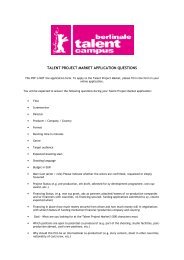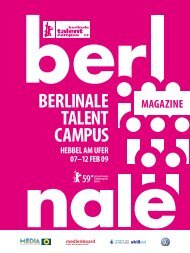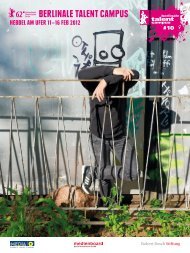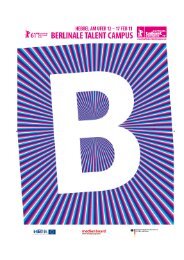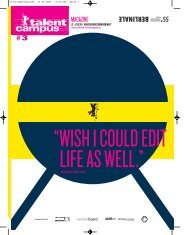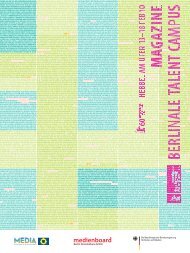magazine berlinale talent campus - Berlinale Talent Campus - Top-ix
magazine berlinale talent campus - Berlinale Talent Campus - Top-ix
magazine berlinale talent campus - Berlinale Talent Campus - Top-ix
You also want an ePaper? Increase the reach of your titles
YUMPU automatically turns print PDFs into web optimized ePapers that Google loves.
Page <strong>Campus</strong> programme<br />
60<br />
Screening the future: excursion to the Heinrich Hertz Institut<br />
In cooperation with Fraunhofer / Heinrich Hertz Institut.<br />
13:00 | Heinrich Hertz Institut<br />
Meeting Point | 12:30 at the entrance to Hau1<br />
Innovations for the digital future – this is the core of the<br />
re search and development work conducted by the Heinrich Hertz<br />
Institut – both in the field of hightech communications systems and<br />
digital media and services use. The Heinrich Hertz Institut is a leading<br />
research institute for Mobile Broadband Communications, Photonic<br />
networks and Electronic Imaging for Multimedia. Multimedia is seen<br />
as one of the key components in information technology as images,<br />
video, language, sound and additional data are being used for an<br />
increasing number of services. Additionally, the institute heads the<br />
German national project (PRIME), which deals with 3D production<br />
technologies for film and broadcasting. Their innovative approaches<br />
for the film industry com prise image processing, image communication<br />
and 3-D displays, as well as the development of new audio technologies.<br />
Research and development trends in the next generation of cuttingedge<br />
screen and sound technologies will be demonstrated and explained<br />
to Tal ents visiting the institute.<br />
dial f for fiction: Script Station Presentation<br />
Moderated by Merle Kröger.<br />
In cooperation with German Federal Film Board (FFA) and SOURCES 2.<br />
14:00 | Hau 3, White Stage<br />
It isn’t the director alone who makes a great film artistic. They<br />
do so because they work with exceptional, artistic scripts. The best film<br />
scripts are therefore lasting works of art which contain moments of<br />
bril l iance, elegance and emotionality that make us want to return to<br />
them time and time again. As every year, the Script Station 2011 will<br />
be a fascinating showcase of current global storytelling – locally rooted<br />
in twelve writers’ experienced reality and personal imagination.<br />
One topic depicted in several stories is farewell – as a long process of<br />
accompanying a mother with dementia, as a harsh break when a wife<br />
suddenly disappears, leaving her husband thrown out of his daily<br />
routine, as a painful experience in letting go an impossible love to save<br />
one’s own identity. Reflections of world politics shine through highly<br />
personal encounters – taking place in Athens and Beirut, or even<br />
beyond the coastline of Somalia. Remarkably strong women have to<br />
deal with teenage pregnancy in the uS Bible Belt or with the drug<br />
scene in Bucharest, with prejudice in Jordan and uganda. While male<br />
protagonists catch our hearts in their vulnerability: be it an outcast<br />
young rebel from rural India or a boy in love with death on the island<br />
of Borneo, Indonesia. These screenplays, at various stages of de velopment,<br />
will be discussed for the first time as works in progress by<br />
their writers and expert mentors, each depicting the aural, visual and<br />
lingual elements required to transform their stories into cinema.<br />
WedNeSday, feb 16<br />
the Internationals: How Small Stories become big<br />
Claudia Llosa, Kornél Mundruzcó and abderrahmane Sissako.<br />
Moderated by dorothee Wenner.<br />
In cooperation with ACPFILMS and Robert Bosch Stiftung.<br />
14:00 | Hau 1<br />
The most powerful stories emerge from the reality one is most<br />
engaged in. They are linked to the place(s) you come from, situations<br />
you’ve experienced and reflect issues that deeply move and interest<br />
you. In the words of awardwinning filmmaker and producer Ab de rrahmane<br />
Sissako, “When you work as a filmmaker, you have an intense<br />
desire to express yourself and I think that the best way to do so is to<br />
speak about oneself or one's experiences”. But how does one transform<br />
small, unique stories into compelling narratives that appeals to in ternational<br />
audiences?<br />
On stage with Abderrahmane Sissako, whose sharply political<br />
films such as BAMAKO and LIFE On EARTH are fitting critiques of globalisation,<br />
colonisation and social justice, is critically acclaimed filmmaker<br />
Claudia Llosa, who won the 2009 Golden Bear and an Academy<br />
Award nomination for THE MILK OF SORROW, and Hungarian director<br />
and 2003 <strong>Campus</strong> alumnus Kornél Mundruczó, whose TEnDER SOn –<br />
THE FRAnKEnSTEIn PROJECT screened in competition at Cannes in<br />
2010, his current project features in the 2011 <strong>Berlinale</strong> CoProduction<br />
Market. The noted filmmakers, whose films are deeply grounded in<br />
stories from their own backyard and have received tremendous<br />
international recognition, will elaborate on how they decide which<br />
stories to develop into films and what makes a local film an international<br />
one. They will discuss the significance of support at a national<br />
and regional level, particularly if one is keen on working and distributing<br />
films internationally.<br />
barbara Hammer:<br />
Making Movies Out of Sex and Life<br />
barbara Hammer.<br />
Moderated by Stefanie Schulte Strathaus.<br />
In cooperation with <strong>Berlinale</strong> Forum Expanded.<br />
14:00 | Hau 2<br />
She has inspired a generation of queer, feminist and avantgarde<br />
artists and filmmakers. Barbara Hammer, a highly prolific visual<br />
artist working primarily in film and video, has made over eighty films<br />
and videos in the past forty years. Galvanised by the second wave of<br />
feminism, Hammer soon became a pioneer of queer cinema. Although<br />
the subjects she addresses are astonishingly diverse, her innovative<br />
and playful approach to form is unchanging. Her work is about re vealing,<br />
showing, expressing, uncovering that which has not been seen<br />
before. “I try to give voice and image to those who have been denied<br />
personal expression.” Her experimental films of the 1970s dealt with<br />
taboo subjects through performance, in the 1980s she used optical




